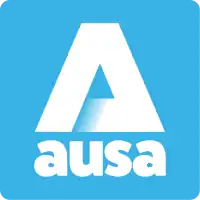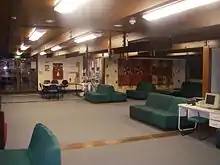 | |
| Motto | Serving Students |
|---|---|
| Institution | University of Auckland |
| Location | Auckland, New Zealand |
| Established | 24 June 1891 (as Auckland University College Students’ Association) |
| President | Alan Shaker |
| Members | c. 27,000 total |
| Affiliations | New Zealand Union of Students' Associations, New Zealand University Games |
| Website | www |
The Auckland University Students' Association (AUSA), founded in 1891, represents students at the University of Auckland.[1] AUSA organises student events, publicises student issues, administers student facilities, and assists affiliated student clubs and societies. It also produces Craccum magazine and bFM radio station.
The constitution of the AUSA centres the organisation around student advocacy and the provision of welfare services. Today AUSA has 27,000 members out of 42,000 equivalent full-time students enrolled at the University of Auckland.
AUSA has over 100 affiliated clubs, the student bar Shadows, University Book Shop, Student Job Search, market days and events such as Orientation, Summer Shakespeare, End of Daze, Capping week, Womensfest, Cultural Mosaic, Blues Awards and Ecofest.
AUSA Executive
This is the incumbent AUSA Executive Team for 2024. [2]
| Executive Position | 2024 Officeholder |
|---|---|
| President | Alan Shaker |
| Treasurer-Secretary | Sarah White |
| Education Vice-President | Layba Zubair |
| Engagement Vice-President | Jade Butler |
| Welfare Vice-President | Jennifer Setefano |
| International Students' Officer | Yueyang Chen |
| Queer Rights Officer | Luna Lyra le Fay |
| Womens Rights Officer | Anna Sue |
| Pacific Island Students' Officer | Andrea Va'ai |
| Post-Graduate Officer | Ben Bonné |
| Co-Tumuaki/Māori Students Officer | Jimah Ruland-Umata |
| Co-Tumuaki/Māori Students Officer | Te Tuhiwhakaura Wallace-Ihakara |
Officers
- President
- Education Vice President
- Engagement Vice President
- Welfare Vice President[3]
- Treasurer-Secretary
Portfolios
- Women's Rights Officer
- Queer Rights Officer
- International Students Officer
- Postgraduate Students Officer
- Pacific Island Students' Officer
- Māori Students Officers
- after an Executive election, the President-Elect.
- 2023 Alan Shaker
- 2022 Alofa So’olefai
- 2021 Anamika Harirajh
- 2020 George Barton
- 2019 Anand Rama
- 2018 Anna Cusack
- 2017 Will Matthews
- 2016 Will Matthews
- 2015 Paul Smith
- 2014 Cate Bell
- 2013 Dan Haines
- 2012 Arena Williams
- 2011 Joe McCrory
- 2010 Elliott Blade
- 2009 Darcy Peacock
- 2008 David Do
- 2007 Lesieli Oliver
- 2006 Dan Bidois
- 2005 Greg Langton
- 2004 Kate Sutton
- 2003 Scott Kelly
- 2002 Ross Burns
- 2001 Kane Stanford
- 2000 Kane Stanford
- 1999 Efeso Collins
- 1998 Mark O'Brien
- 1997 Phillip Stevens
- 1996 Phillip Stevens
- 1995 Brendon Lane
- 1994 Cyrus Richardson
- 1993 Richard Watson
- 1992 Douglas Sadlier
- 1991 Douglas Sadlier
- 1990 Ella Henry
- 1989 Des Amanano
- 1988 Richard Foster
- 1987 Graham Watson
- 1986 Graham Watson
- 1985 Graham Watson
- 1984 Trish Mullins
- 1983 John Broad / Jonathan Blakeman
- 1982 David Kirkpatrick
- 1981 Wayne McIntosh
- 1980 Kevin Hague
Membership

AUSA membership is free to all current students of the University of Auckland.[1]
As required by legislation, the University Council conducted a student referendum in 1999 on whether membership in AUSA should be voluntary or compulsory. The majority of students supported voluntary membership and this was enacted. Referendums on the same issue were held in 2001 and 2003, and in each case, the majority of students voted for voluntary association. (The request for a referendum is in the form of a petition to the University Council, which any student may call, and thus must be conducted, provided no two referendums are less than two years apart.)
Detractors of voluntary student membership (VSM) say that AUSA suffers drastically from it, and that VSM undermines AUSA's ability to advocate on behalf of students and provide welfare services.[1] They also say that in controlling the flow of money, the university dictates the terms to some extent of its operations through various agreements. As early as the mid-nineties, a number of incidents increased AUSA's credibility and alienated a lot of members who were previously disinterested in student politics, and were an undeniable factor in the 1999 referendum. Contentious issues like allocation of funds was the focus of many debates at the Quad.
Proponents of VSM, on the other hand, claim VSM means freedom of choice for students. They cite the United Nations declaration of freedom of association. They also paint AUSA executives under compulsory unionism as being wasteful, and believe that under voluntary AUSA executives are forced to be more accountable to members. They claim that the level of intervention is very limited (for example, the conditions are only that AUSA must run orientation and the like).
Craccum
Craccum is the weekly magazine produced by the AUSA. The name originated from the scrambled acronym of "Auckland University College Men's Common Room Circular". The publication has frequently found itself in legal difficulties due to its deliberate attempts to be controversial. These attempts have included an issue containing methods to create a bomb, and an issue discussing ways to commit suicide.
A publicity stunt in 2005 saw Craccum sell its cover - which was bought by Salient, the student magazine of Victoria University of Wellington Students' Association, with funding from Victoria University of Wellington's marketing fund. The sale proved to be ironic; the theme of that issue of Craccum was corporate sellouts.
bFM
95bFM (or simply bFM) is a typical student radio station that plays alternative music. Like other student broadcasters, it supports local artists well before they become mainstream.
Originally started as Radio Bosom, a capping stunt, bFM has gone a long way. Today, with voluntary student union membership, bFM is pushed to make a profit for the Association, and exists more as a corporate entity than a student radio station.
References
- 1 2 3 Barton, Chris (18 December 2010). "Students pay high price for freedom". New Zealand Herald. Retrieved 24 April 2020.
- ↑ http://ausa.org.nz/your-ausa/about/our-executive/
- ↑ "A Word from the President & EVP | AUSA". Archived from the original on 13 April 2014. Retrieved 2014-04-09.